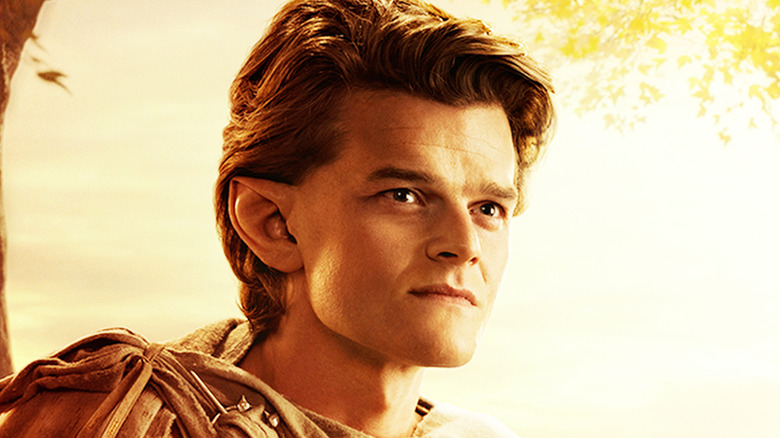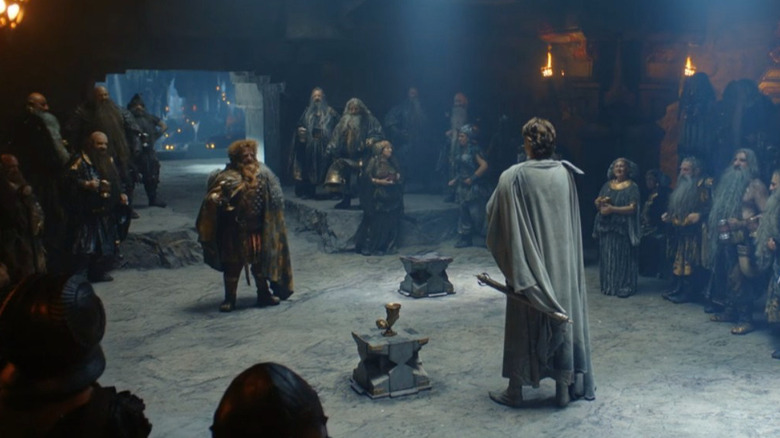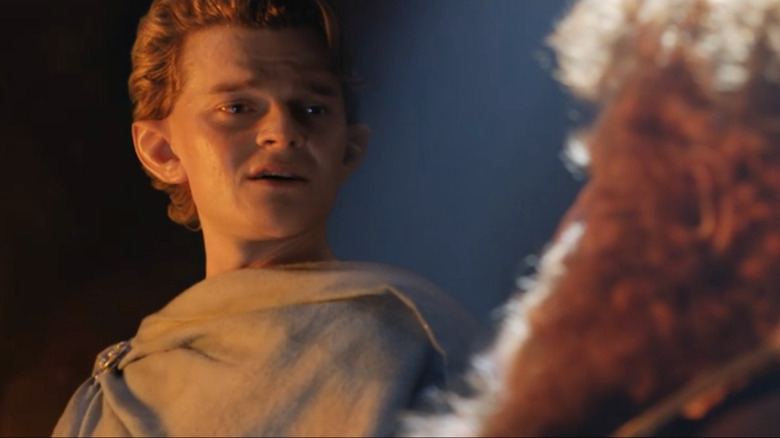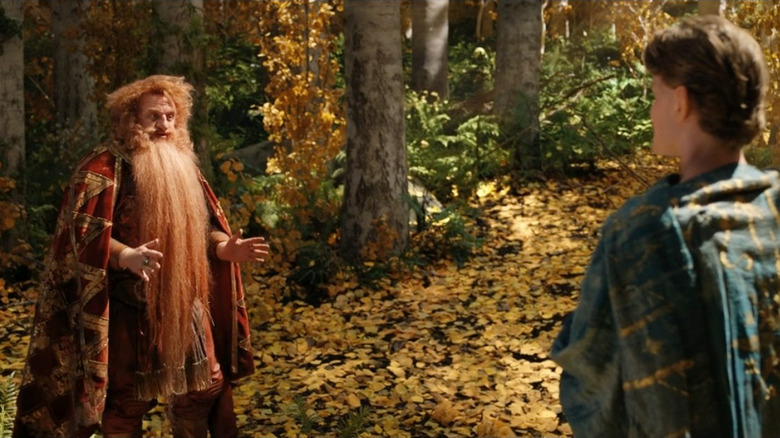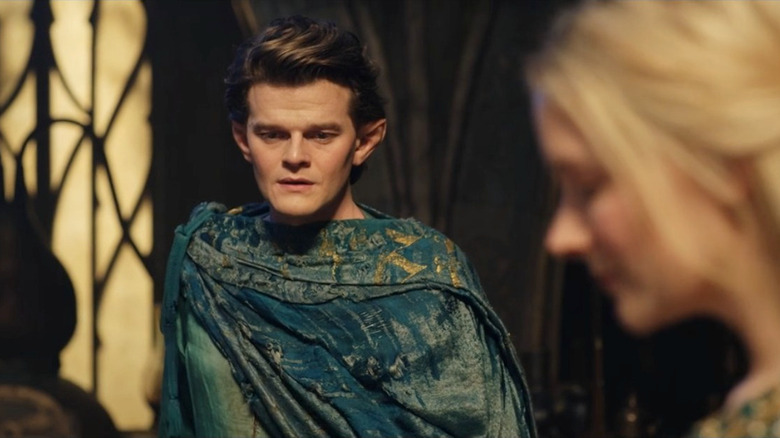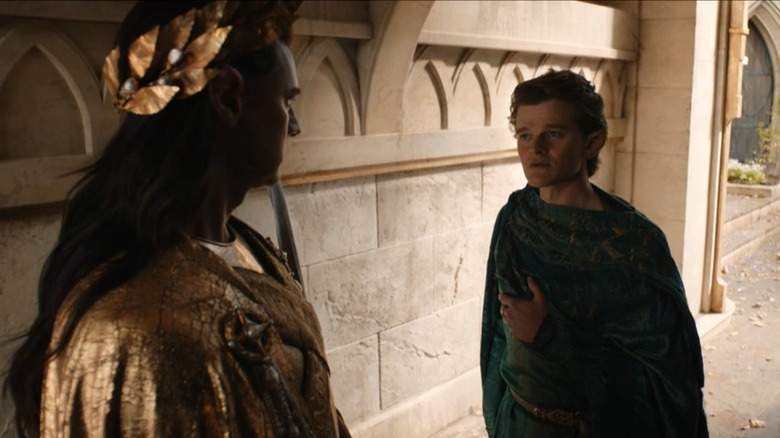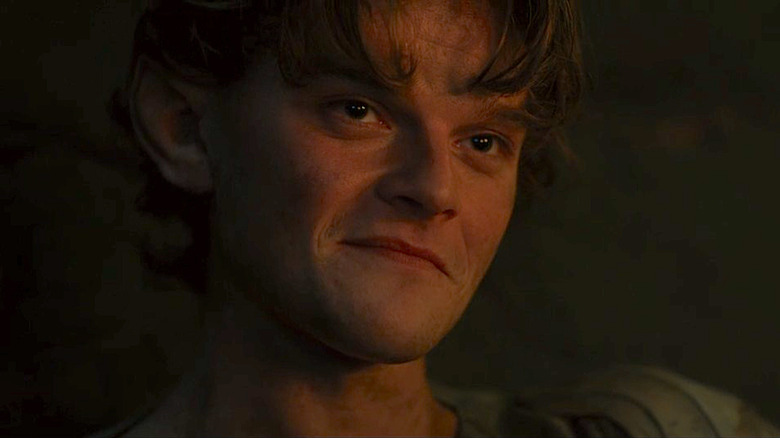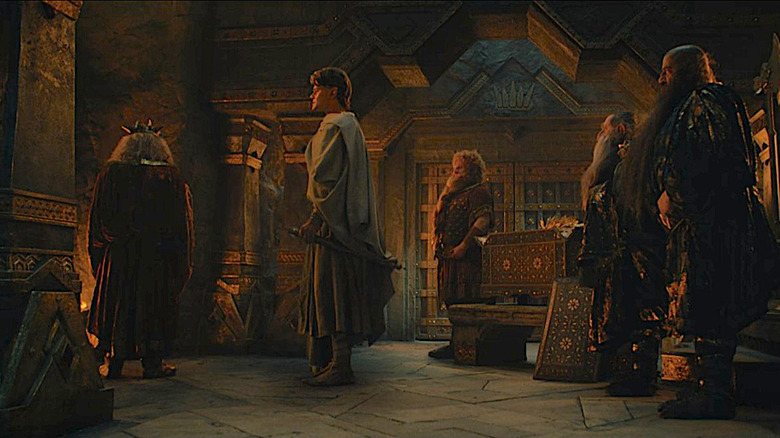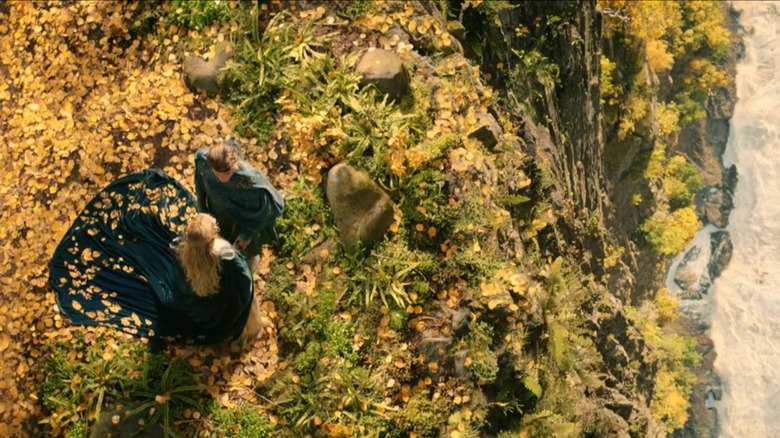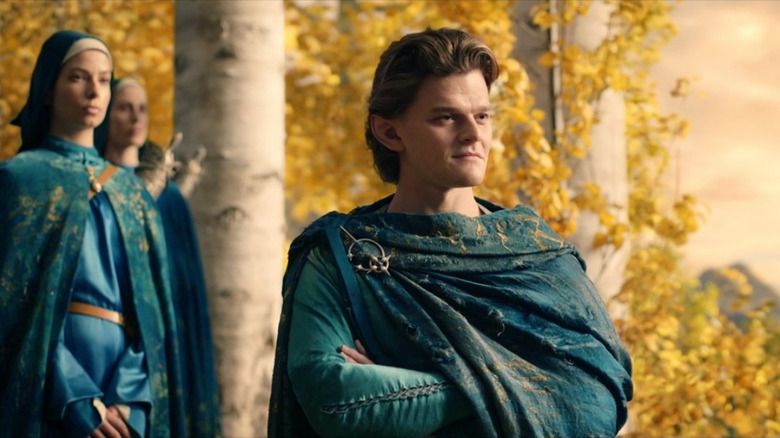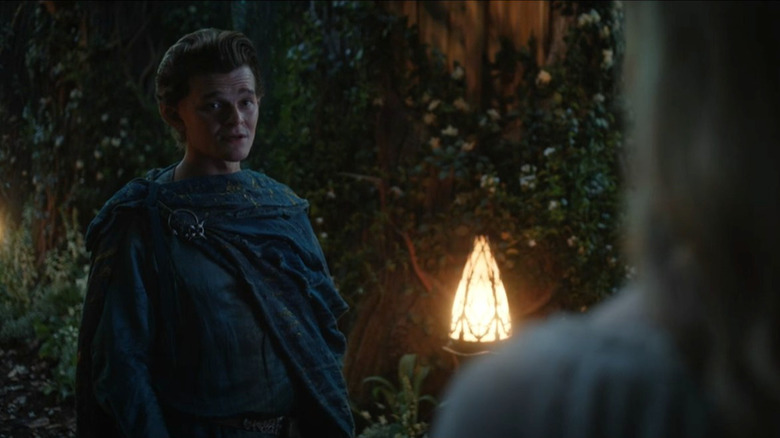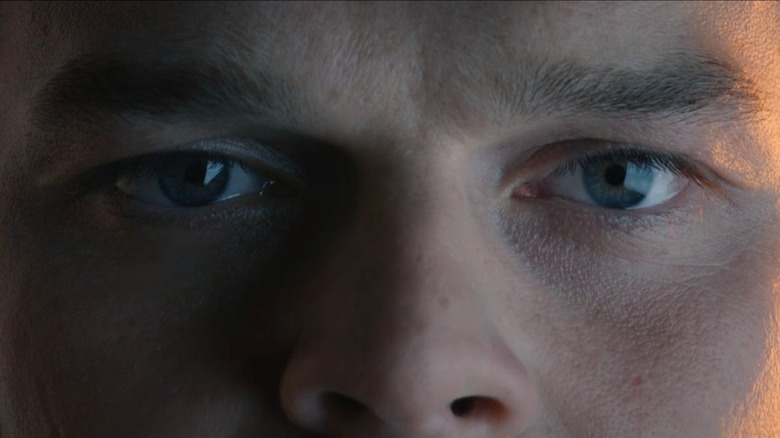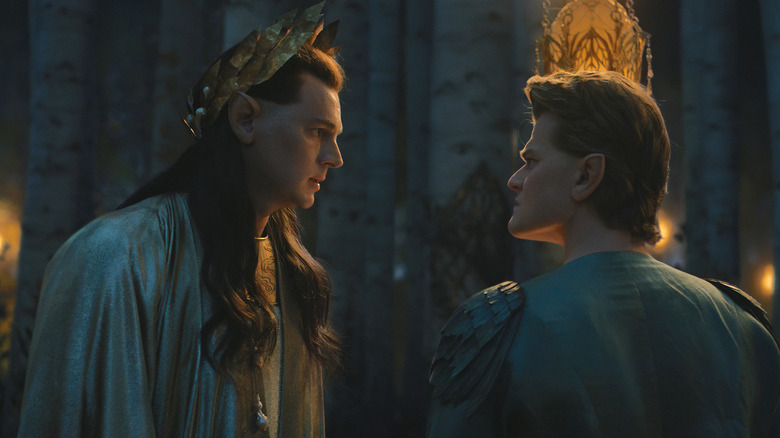Elrond's Best Moments In The Lord Of The Rings: The Rings Of Power Season 1
Elrond Half-elven is one of the most important people in all of Middle-earth. Even in Tolkien's world of endlessly fascinating, one-of-a-kind characters, this part-Elf, part-Man, part-Maia leader is an utterly unique individual. He plays an important part in both the Second and Third Ages, particularly when it comes to resisting the Dark Lord Sauron. He's a wielder of one of the Elven Rings of Power. He's the founder of Rivendell. Oh yeah, and he's related to, like, every single important person in Middle-earth's history.
Elrond has long been a favorite among fans of Peter Jackson's two Tolkien trilogies, "The Lord of the Rings" and "The Hobbit" movies, thanks to a stellar performance by Hugo Weaving. The legendary actor brought the perfect combination of youthful energy, elegant regality, and venerable wisdom to the role. As of 2022, though, Weaving is no longer the only Elrond in town. Newcomer Robert Aramayo delivers a much younger rendition of the half-Elven hero in J.D. Payne and Patrick McKay's serialized adaptation, "The Lord of the Rings: The Rings of Power."
Aramayo acquits himself well as a younger, less-experienced version of the character operating as Gil-galad's herald, Galadriel's friend, Celebrimbor's helper, and Durin's bestie. Pretty much every time Elrond is in a scene, he nabs everyone's attention. These are some of Elrond's best moments throughout Season 1.
The right of Sigin-tarâg
In Episode 2 of Season 1, Elrond is sent to Celebrimbor to help him with a special task. This ends up being the need to build a massive, super-powered forge to melt down light-imbued mithril by spring. In pursuit of a solution, Elrond heads to nearby Khazad-dûm, where he's denied entrance and invokes the right of Sigin-tarâg as a way to gain the ear of his old friend, Prince Durin IV. The ensuing competition is equal parts exhausting and epic as the two old friends — one blissfully immortal, the other bitterly not so — break one rock after another in a race to see who can last the longest. Ultimately, it's Elrond who gives in, asking Durin to personally escort him from the Dwarven realm as a consequence of his perceived failure.
This rock-breaking scene is a fun way to introduce the complicated friendship between Elrond and Durin for multiple reasons. First, we see a little bit of that hidden Elvish strength on display (Elrond ends up being a general and warrior later on). We also see Elrond's wisdom and diplomatic personality at work for the first time. The revelation that comes later in the season — that Elrond actually lets Durin beat him — makes the performance that much more entertaining.
Talking Durin into reconciling with his father
Elrond is a lot of things to a lot of people. One little detail that often slips through the cracks is the fact that he's an orphan. When he's still a wee baby Elf, Elrond is captured in a civil war and never sees his parents again. This leads us to a scene in Season 1 where an exasperated Durin IV rails against the difficulties of working with his father, King Durin III. The Dwarven prince even vows never to speak to the old goat again, prompting an impromptu pep talk from Elrond.
The half-Elven herald tells his friend about his father, Eärendil, who became a hero and was set to sail the skies of Middle-earth forever as a star. He reveals doubts regarding what his dad would think about how he's handled the family legacy, and adds that in the end, he wouldn't care what the opinions were, as long as it meant they could talk, just one more time.
Elrond encourages Durin not to waste the time he has left with his father. Things wrap up with the pair lightly arguing about who saved who when they first met (thanks to the thoughtful questioning of Durin's wife, Princess Disa). The scene is moving, and a great example of how important Elrond and Durin's friendship is in the show. It's also a wonderful display of the emotional depth that Aramayo brings to the hitherto stoic role of the half-Elven counselor.
Elven-Dwarven banter, saving the Elves, and raw meat
All of Durin and Elrond's interactions are pure gold, but this moment shines especially brightly. The half-Elf spends the first half of the season unknowingly discovering the existence of mithril and bringing news of it (and Durin himself, on a diplomatic visit) back to Lindon. There, in Episode 5, Gil-galad and Celebrimbor spill the beans, informing their youthful half-Elven companion that if they don't get a lot of the shiny new metal quickly, they're all going to fade into obscurity (a non-canon plot point added for the show).
All of this leads to a moment where Elrond, in turn, informs his friend that his people need the Dwarves' mithril, and that the fate of the Elven race is in Durin's hands. Along with containing the immortal line, "Give me the meat, and give it to me raw," this scene also shows yet another friendly round of banter between the two best friends. Elrond finally gets the burden of his accidental deception off of his shoulders, and is even relieved enough to joke back and forth with Durin about who will get the credit for Disa's new table, which the latter poached from the king of Lindon.
Elrond puts things together
While Elrond and Durin's friendship steals the spotlight for most of the season, the earliest platonic connection we see for our half-Elven hero is actually with his future mother-in-law. In episode 1, Elrond reconnects with Galadriel in the Elven kingdom of Lindon, where he helps convince her to sail back across the seas to Valinor. After that, the two characters don't interact again ... that is, until they bump into each other in Eregion in the finale, when Galadriel shows up with one Halbrand, the supposed King of the Southlands, in tow.
Over the course of that episode, it's revealed that Halbrand is actually Sauron. After failing to seduce Galadriel to join him in his evil ways, the Dark Lord disappears, leaving the future Lady of Lorien lobbying for the quick creation of not two, but Three Elven Rings of Power. They're clearly not only meant to be baubles to stop the Elves from fading, but to function as tools for resisting the rising evil.
All of this drama leads us to a scene where Elrond, having discovered Sauron's true identity, arrives in Celebrimbor's forge, just in time to see Galadriel and the Elven smith ogling the three freshly formed mithril-alloyed rings. He looks first at the rings, then at Galadriel, then back at the rings, taking in the gravity of the entire situation. Without saying a word, Elrond sends a clear message to his old friend that he knows what's happened, and that he's not at all cool with where things are heading.
Confronting Gil-galad
During the Second Age, when "The Lord of the Rings: The Rings of Power" is set, Gil-galad is the High King of the Noldor Elves, the monarch of the Elven kingdom of Lindon, and the most powerful ruler this side of the Misty Mountains. Elrond's familial connections give him some initial political pull in the Elven hierarchy of Lindon, yet he isn't at the top of the power pyramid. On the contrary, when we first meet Elrond in Season 1, he learns that he wasn't invited to Gil-galad's latest counsel because it's for Elf-lords only.
This unique position of important irrelevance dogs Elrond throughout Season 1, as he finds himself playing the part of an effective pawn in Gil-galad and Celebrimbor's larger political game. The half-Elven herald's frustration at this perpetual manipulation finally boils over in the finale, when his superiors decide the mithril experiment has failed and the Elves need to get the heck out of Dodge before they fade away.
All of this leads to an important Elrond moment, when he chases Gil-galad down and asks him for three more months to try to find a solution to the fading issue. Gil-galad replies that it's merely a fool's hope, and Elrond's response is to drop some of Gil-galad's own words of wisdom. "Hope is never mere, not even when it is meager," he says. "Or have you forgotten your own counsel?" It's a great moment that sees Elrond begin the journey from herald and speech writer to one of the mightiest lords of Middle-earth.
Mining for mithril with Durin IV
The Elrond-Durin scenes just keep coming, and with good reason, too. This pair of friends has an amazing dynamic throughout Season 1. This intimate connection is on full display in Episode 7, when we see them both go rogue, disobeying King Durin III to mine some mithril in an unstable mine. This scene is critical to the development of the story in multiple ways: Durin defies his father, the Balrog's appearance, etc. And yet, even if you strip away its importance, it's still a great moment, if only because Elrond is in it.
Throughout the multi-minute moment, we see Elrond and Durin rest from their mining, to let the surrounding stone settle. As they take a break and hydrate, the pair continues their ongoing banter. Elrond informs Durin that he threw their rock-breaking contest on purpose, admitting that he was a bit winded, but nothing worse. The pair comments on how Durin is a rather Elvish Dwarf, and Elrond is — get this — a Dwarvish Elf. While the story eventually picks up momentum again when the pair of friends are caught by Durin's father, this quiet scene is a welcome reprieve amid a busy end to the season, and one that has Elrond's charisma firing on all cylinders.
Elrond the envoy
As Elrond's role in Season 1 expands, he finds himself at the center of a giant Elven-Dwarven controversy, revolving around the discovery and importance of mithril. By Episode 7, Gil-galad's herald heads back to Khazad-dúm, this time to speak to the king of the Dwarven mansion, Durin III.
This leads to a great moment in which Elrond presents an epic Elven proposition to the Dwarves. In exchange for mithril, the immortal folk will give the Dwarves 500 years' worth of timber, game, and grain. When Durin asks why he should trust any of the Elves, Elrond responds that he shouldn't, emphasizing his own half-Elven nature as a factor that gives him unique insight into many cultural flaws that the Elves themselves can't see. From beginning to end, the speech is very convincing, and it sheds light on yet another fascinating facet of this complicated and talented Middle-earth icon.
Talking a friend down
Elrond doesn't have a clear allegiance to any one people, group, or nation, and his diplomatic nature makes him a favorite to all and sundry. Durin IV can't stay mad at him. Disa loves him at first sight. And Galadriel? She has a long and enduring history as a close friend of the son of Eärendil. In fact, their friendship runs so deep that Elrond is one of the only people who can truly talk to her as an equal. He can even confront her to her face without finding himself at the business end of her dagger.
This leads to one of Elrond's best moments, which comes right after Galadriel arrives back in Lindon early in the first episode. After a happy reunion, it takes Galadriel half a second to start planning how to ask High King Gil-galad for fresh soldiers and supplies to continue hunting Sauron. In response, Elrond tries to talk some sense into the rash Commander of the Northern Armies. When Galadriel insists, Elrond becomes stern, laying out the situation plain and clear. She's already pushed her luck with the king, and he's overlooked her impetuous behavior so far. If she doesn't stop, though, things aren't going to go so well in the future. This scene offers a brief glimpse of Elrond's sterner side — a part of his personality that will serve him well in the future, as he repeatedly confronts Sauron, builds the Elven haven of Rivendell, and ultimately helps a little Hobbit destroy the One Ring itself.
Elrond enjoys his own speech
When we first meet Elrond, we see him sitting in a tree, writing something. He mulls over words until he's interrupted by messengers, who inform him that Galadriel has unexpectedly arrived from her long adventure hunting Sauron in the frozen north. As he goes to meet his friend, Elrond passes his writing off to another Elf, telling him it's for the ceremony.
The ceremony ends up being an event where Gil-galad honors the accomplishments of Galadriel and her troop of intrepid Elvish warriors. As the High King gives the speech, it becomes apparent that he's memorized Elrond's words and is repeating them verbatim. This is confirmed when the camera pans over to Elrond, showing the king's herald mouthing the words silently to himself as his lord utters them. Galadriel even catches the self-indulgent moment and smirks at her friend.
Tolkien's original texts refer to Elrond as Gil-galad's herald, but the author doesn't go into much detail about what his duties look like in that capacity. The speech scene provides some fun artistic insight into the day-to-day duties of the Elven hero as he serves his king and awaits his own epic future.
A long conversation
One of the nice things about a serialized adaptation of Tolkien's stories is that it affords more time to conversations and exposition, even compared to Peter Jackson's incredibly lengthy films. One example of this comes midway through Episode 1, when Elrond helps Galadriel process the fact that she's being sent off to a supposedly happy retirement in Valinor.
In the conversation that takes place after Gil-galad's thank you ceremony, Galadriel informs Elrond that she intends to refuse her king's gift. From there, the pair of compatriots verbally spar back and forth, debating whether Sauron really is gone, if evil is truly defeated, and who has seen worse things in their past.
Despite Galadriel's intensely one-track mind, Elrond actually manages to disarm her with his words and temporarily convince her to accept her Valinorian trip into blissful exile. While that eventually backfires when she jumps off the ship in the middle of the ocean, the moment is yet another impressive example of Elrond's quiet, diplomatic approach. It shows just how much he can get done, even in the rough-and-tumble world of Middle-earth.
Wielding his Elvish vision
Elvish vision is on full display in "The Lord of the Rings." In the books and movies alike, Legolas is always one step ahead of his companions, because he can literally see what's coming from miles and miles away. Aragorn famously asks him what his Elf eyes see, in an attempt to track the Uruk-hai that he, Legolas, and Gimli are chasing across Rohan.
"The Lord of the Rings: The Rings of Power" takes this impressive Elvish attribute to the next level. In Episode 4, Elrond fails to discover what secret Durin is keeping from him and Celebrimbor. After failing to pry the information from the clever and tight-lipped Disa, the half-Elven hero resorts to a less refined form of detective work: spying. Fortunately, he has his overpowered Elven eyes to help him, which leads us to another one of his best moments.
As Durin and Disa discuss their secret mining expedition for mithril, Elrond oversees the conversation from a distant bridge in Khazad-dûm. He lip-reads their conversation, and finally discovers the information he's been chasing through this unique form of visual eavesdropping. Along with being a cool use of Elvish vision, the way the scene is shot, with the camera backing way out before cutting to a close-up of Elrond's eyes and mouth, is a fun new way of displaying the dazzling skill on screen.
Keeping secrets
In Episode 5, Elrond and Gil-galad catch up with one another after the former's trip to Khazad-dûm. The tension between the two is palpable from the get go, as Gil-galad accuses his herald of lying to his king. Elrond fires back by claiming that he's the one who has been lied to from the beginning.
The ensuing conversation reveals the Elvish need for mithril, leaving Elrond in the unenviable position of keeping his friend's secret or saving his people. Love or hate the use of mithril as a blatant plot device, as far as Elrond is concerned, the scene is pure gold ... or whatever rare metal you prefer to use to quantify exceptional value.
Even as Elrond discovers the overwhelming importance of mithril, he stays loyal to his oath to Durin to keep the miracle ore a secret. At the same time, he's painfully aware of the fact that something has to be done about the Elvish dilemma, which leads him to take the situation directly to Durin himself. It's an ethical move that highlights the half-Elven hero's impeccable character and deep inner wisdom — both of which will continue to serve him well for thousands of years to come.
